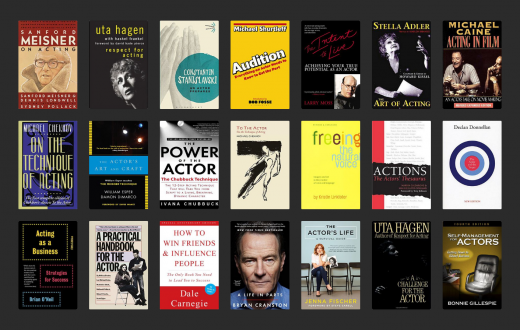Acting, like any other field of art, has its own unique terminology. If you’re looking to enter the world of acting or just curious to learn more about this creative pursuit, understanding these terms is essential. From terminology related to the physical act of performing on stage or in front of a camera, to terms used for describing the actor’s craft and training, there are plenty of phrases that are important to understand.
“On the nose” – referring to dialogue or acting that is too obvious or direct.
“Hit your marks” – a reminder for actors to physically hit their designated spots on stage or set.
“Lights, camera, action” – the traditional cue for actors to begin their performance.
“Theater of the mind” – referring to the ability of an actor to create a vivid mental image for the audience through their performance.
“Off-book” – when an actor has memorized their lines and no longer needs to refer to the script during a performance.
 “Break a leg” – said to actors before a performance to wish them good luck.
“Break a leg” – said to actors before a performance to wish them good luck.
“The show must go on” – said to remind actors that the performance must continue, even in the face of difficulties or setbacks.
“Stealing the show” – said when an actor gives a particularly powerful or memorable performance.
“There are no small parts, only small actors” – said to remind actors that even small or minor roles are important and can be made memorable through strong performances.
“Living in a fishbowl” – said to describe the intense scrutiny and public attention that actors and celebrities are often subject to.
“The fourth wall” – refers to the invisible barrier between the actors and the audience, which actors are expected to “break” or acknowledge in certain performances.
“Typecasting” – when an actor is consistently offered and identified with a particular type of role or character.
“Understudy” – an actor who stands ready to perform a role in case the regular actor is unable to do so.
“Method acting” – an acting technique in which an actor immerses themselves in the character’s emotions and experiences to create a more authentic performance.
“A star is born” – said when a previously unknown actor gives an impressive performance that propels them to fame.
“Green room” – a room provided for actors to wait in before and during a performance.
“Blocking” – the process of determining and rehearsing the physical movements and positioning of actors on stage or set.
“Character arc” – the development and change of a character over the course of a play or film.
“Improvisation” – when an actor creates or ad-libs their dialogue or actions in a scene without a script.
“The stage-fright” – referring to the nervousness or anxiety that actors may feel before a performance.
“Offstage” – refers to the area outside of the acting area, typically behind the curtain.
“Backstage” – refers to the area behind the stage, where actors and crew prepare for a performance.
“Call time” – the designated time for actors to arrive at the theater or set for a rehearsal or performance.
“Cue to cue” – a rehearsal in which actors only perform the sections of a scene leading up to and immediately following their own lines.
“Rehearsal process” – the process of preparing and rehearsing a performance before it is presented to an audience.
“Breaking down the script” – the process of analyzing a script to understand a character’s motivations, backstory, and relationships.
“Motivation” – the reason or reasons that drive a character’s actions and decisions.
“Subtext” -the underlying meaning or emotions beneath the surface of a character’s words and actions.
“Table read” – a preliminary reading of a script with the entire cast and crew present.
“Beat” – a significant moment or change in a scene or character’s arc.
“Monologue” – a long speech given by one character.
“Cold reading” – the act of performing a script that you have not previously read or rehearsed.
If you want to add to the list of acting terms, please follow DirectSubmit / NYCastings and comment!






